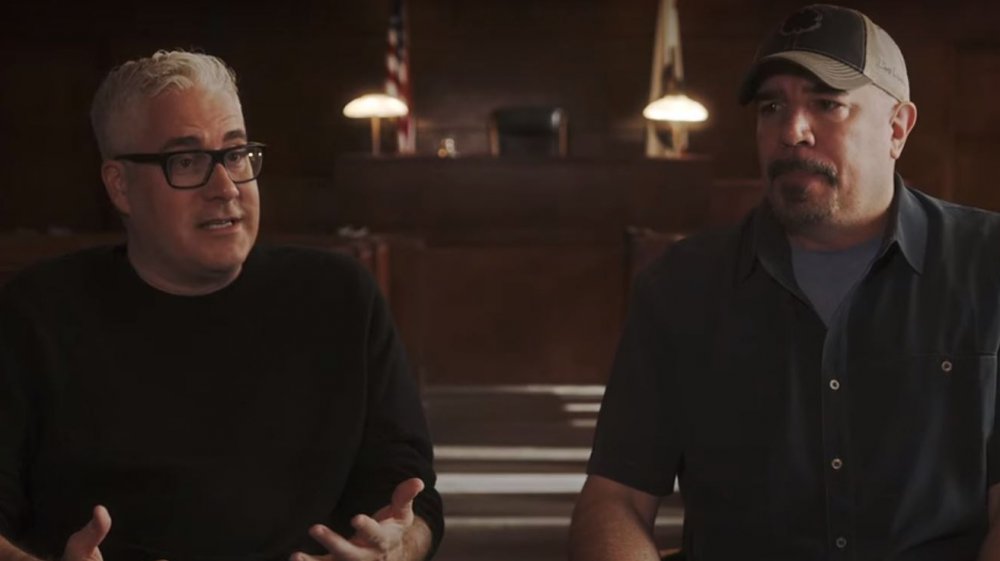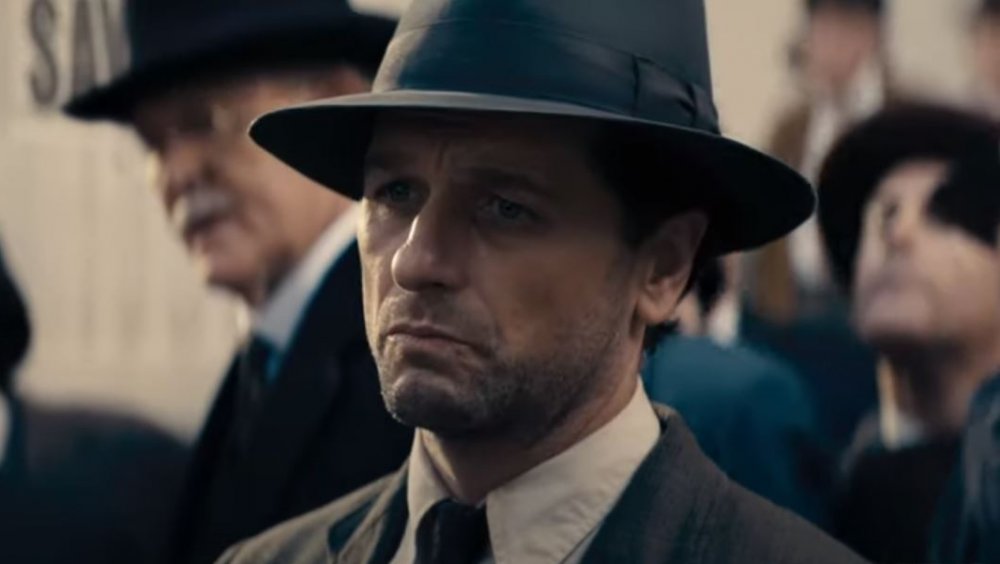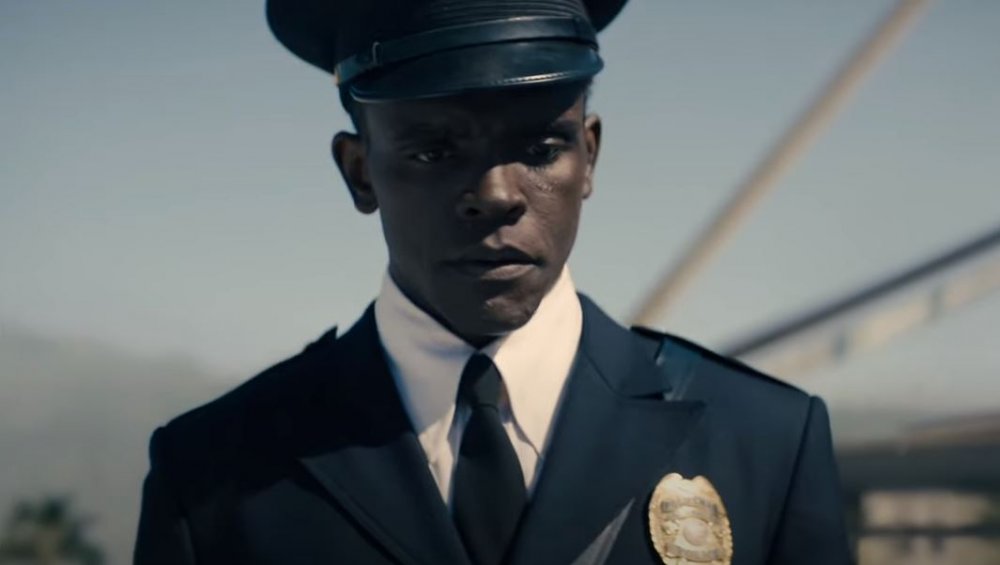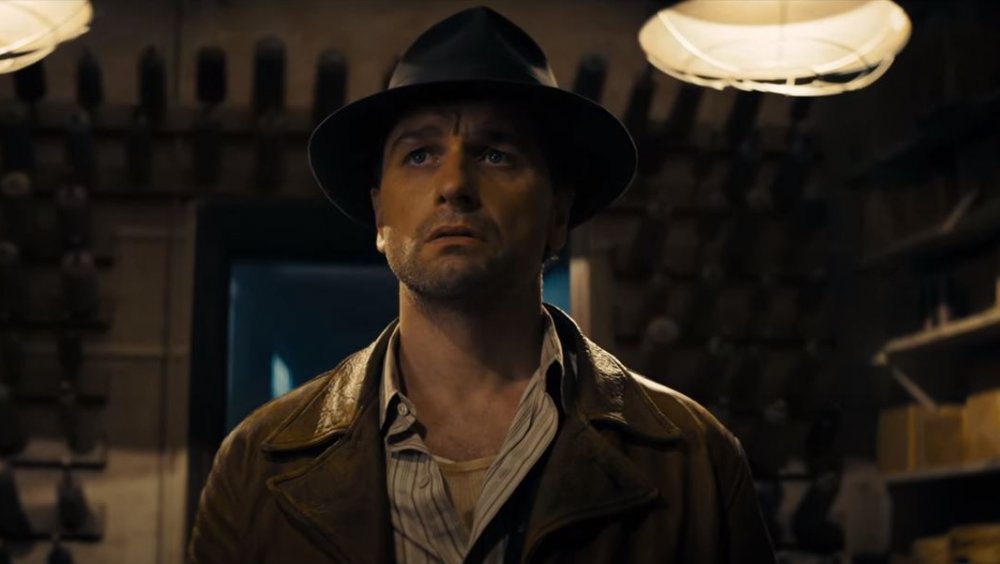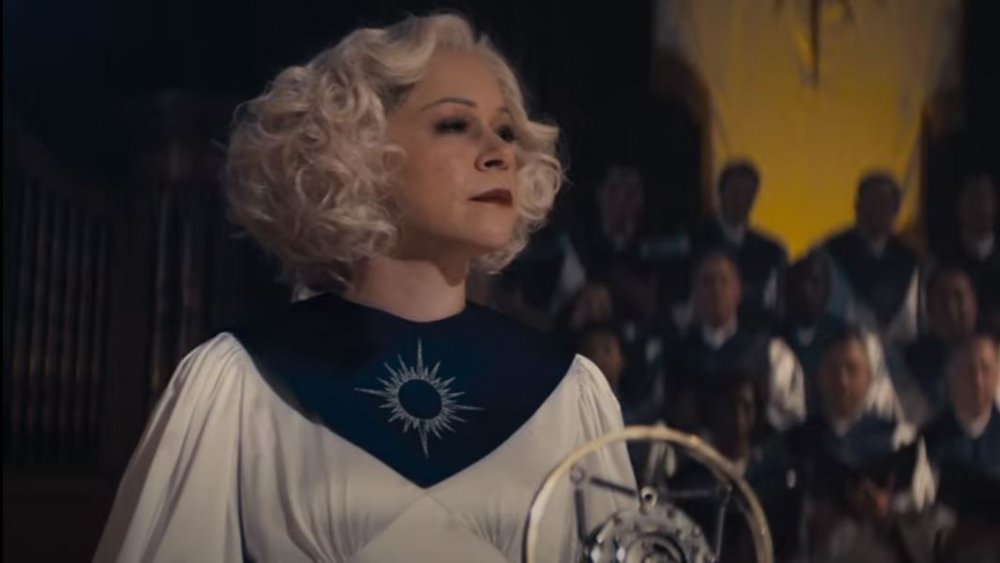Rolin Jones And Ron Fitzgerald, Showrunners For Perry Mason - Exclusive Interview
HBO's Perry Mason is very different from the Perry Mason of old. A longtime passion project of Robert Downey Jr. that he ultimately had to settle for producing, it debuted to strong ratings and promising reviews — and has been rewarded with a second season. A far different Perry Mason than Raymond Burr's iteration — darker, morally flexible, and serialized — the series is guided by showrunners Rolin Jones and Ron Fitzgerald. The two worked together on both Weeds and Friday Night Lights, and Jones had a big hand in season two of Westworld. It's a different style of show for both of them, but it's hard to argue with the success of a show jumping from "miniseries" designation to getting another go at it.
Jones and Fitzgerald sat down for a phone interview with Looper. They discussed the making of the show, Robert Downey Jr.'s involvement, and how the show being so topical just means things haven't changed all that much.
A new take on Perry Mason
Perry Mason, very iconic character, long history in television, but there hasn't been a lot of new Perry Mason material in a long time. How would you go about keeping this iconic character fresh?
Ron Fitzgerald: Ha.
Rolin Jones: Fitz, take it away, take it away.
Ron Fitzgerald: I guess I think it's what you choose to use as your backdrop, the world that you're throwing these cases up against. There are 80 Perry Mason books, right? Even if you're — much like Sherlock did with the Cumberbatch one — but even if you're taking these plots and you're doing what you want, you're using them as inspiration. I think there are a lot of things you can do with the different type of world you choose to step them in, and those things... There's no need to do it in the Raymond Burr '50s and there's no need to do it in the Erle Stanley Gardner lily-white '30s. I think there's a way to find interesting, I want to say venues, but that's not right, but you know what I mean? And backdrop isn't quite right. But it's like, what's happening in town when Perry is doing his thing?
And speaking of what makes it new is that Perry Mason has always been episodic or a TV movie. I think this is the first time Perry Mason's ever been serialized. What's behind the choice to serialize him?
Rolin Jones: We're hired by HBO, and so I don't know if they have a formula in the dramatic canon where you would deliver the piece of pie at the end of the episodes. I think it was just one of these things where they were like, "There is this iconic character that is sort of well known in one way. We've got a hold of these books. He's kind of a slightly different guy than he was portrayed in the '50s and '60s." I think the opportunity there was to, what is the burden, what are the consequences of the caseload and of actually the job that Perry Mason has, you go home with them, you are in between little plot moments with him.
For any HBO show that's character-driven, it wants to be a tough, long journey. While the plots are really terrific, and really well-made, he was a terrific writer. He was not interested. There was sort of a delivery system for some mystery busting. That's another way that this becomes fresh and new. You're just like, okay, well everything, all the stuff, like family background, all this stuff added on to him so that you are loaded up with them as he's macheting his way through the landscape.
Playing with genres and how the system can't be trusted
On this topic in a way is the work you two have done, Ron, especially, you spent a lot of time playing with genres. Do you have anything you're looking forward to doing here that's a little bit different, or do you have something you want to do in the future, just keep playing with genres in this way?
Ron Fitzgerald: Yeah. I think that we're going to go forward and it's going to be a noir, and that's what we're doing and we're going to try to make it not full of tropes, or at least to twist them if we can, if we're going down that road. It's never going to be like that exactly. It's never going to be a crime of the week show. I don't think that's what people tune into HBO for.
And it's also hard. I mean, that exists. I don't want to anybody to stop loving Raymond Burr, he's out there, man. You know, you go watch it. Absolutely. We have a lot of respect for everything that was done on the TV show...
Rolin Jones: ...Playbook, all respect, the welfare, everything Erle Stanley did in his writing. So we just want to use it as a jumping off point and try to put a little bit of a modern take on it, or at least a modern lens to show that, sadly, not a whole lot has changed since the '30s to the modern day times here.
A big theme of the show is basically that institutions can't totally be trusted. Sometimes you have to do things outside the system. Sometimes the entire system is compromised. It's not just one or two bad apples. And when you were doing that, were you just trying to play with the noir genre tropes or were you actually trying to reflect on the world as it is? Because it came out at a very pertinent time for those themes.
Ron Fitzgerald: We're not prophets, right? We didn't know that this particular moment in American history was going to collide with our show. If anything, it's more evidence that it was always there, front and center. We are telling sort of a shaggy dog story where classically, you want a bunch of people who don't have a lot of power to take on a system. With the amount of crime that we have in an HBO show, it's —
At this point in the interview, a siren came blaring by Rolin's end of the line.
Rolin Jones: Someone has a crime right now, driving by me.
It's a little on the nose. [Laughter]
Ron Fitzgerald: I mean, with the crime that you have, the eight hours we have to tell the story, you're allowed to hit some subtleties and some nuances there. So it isn't right yet. You're just talking about the institutions. It's not just a bunch of evildoers. It's what happens when you're part of a system, and do you get corrupted along the way? Just for basic survival, I got to feed my family. There's a number of characters who I think, if they were in on the particulars of this crime at the beginning, would have jumped ship. But if you get him deep enough into it, the machinery of the institution will scoop you up and take you along with it.
So that's the generosity that you have with the crime to be able to tell that part of the story. But yeah, I think we've been talking a lot about how the systematic racism that's in our show, but also sort of like the darker sides of capitalism in our show. One of the things that really didn't shock us, but it was just sort of, "Yup, there it is," is where we were planting our Hoovervilles when we were doing our downtown scenes and they were very, very close to where homeless encampments are right now. There's just the haves and the have nots are very clear and distinct and not much as has changed over the 90 years.
RDJ's involvement and getting cheeky about Matthew Rhys's casting
So, switching gears a little bit, I want to talk a little bit about Robert Downey Jr. Could you walk me through how he went from being cast in the role to what he's doing as executive producer right now?
Ron Fitzgerald: Sure. I mean, it's his schedule. He is the top actor in the world right now. The guy's got a bazillion projects, so Perry Mason has always been a special project for him. He has a lot of personal love for it, and he really, really wanted to do it. But every time we could get close to it, he could never line his schedule up. And you can't walk away from the Avengers franchise or the Sherlock franchise and come over here and do this franchise as well. So it just slowly, the sense was that he never wanted to say I can't, I just can't, until it was absolutely obvious that it just couldn't happen. And so then he was like, well, what can I do? How can I jump in here and support this project, because I care about it so much? And that's how he transitioned over. It was mostly practicality.
Rolin Jones: So it's sort of a book ending way, he's there with us while we're launching the scriptwriting of it and some inspiration about where to take Perry. And then when he had to step away and we fortunately got Matthew, then it just became sort of a notes and a macro lens on the whole thing. I think he's been really instrumental on the front and the back side of the show.
How did you get Matthew Rhys involved?
Rolin Jones: We lucked out.
Ron Fitzgerald: We kidnapped him. We drugged him and spirited him away and didn't let them out of the room, until he agreed to do it.
Rolin Jones: The great god of acting came down and protected us in a bubble for two weeks. Then we slipped in and we're like, "Hey, maybe we should do this." And he was like, "Okay, maybe I'll do that." Then we made him sign a contract in blood and you know, we spiritually had him locked down. It was a real act of thievery.
Sister Alice, what's next for them, and defeating the "spiky bug"
Could you talk to me a little bit about how you decided to integrate that character of Sister Alice (played by Tatiana Manslay) into the story? Because this is a little outside what Perry Mason normally does.
Rolin Jones: Well, he's got the Stuttering Bishop in novel nine. I think we were purposely looking for, at the beginning, like when we knew the timeshare and we knew some of the things we were extrapolating from the novel, and then we just wanted to graph it onto some particular 1930 to 1931 Los Angeles history and try to find something that you wouldn't normally see in a noir. So that again, it was fresh and new and it opened up just a little bit of backstory for Perry, with a religious upbringing, which most any Angeleno at that time probably would have had the one that he had lost.
Rolin Jones: We thought it would be nice if the stories matched up against a very, very powerful and iconic religious figure. And in Los Angeles, one of those sort of gifts that just kind of, once we started beating it out, started giving us more and more.
What are you two looking forward to doing in the future? When Perry Mason is done, are there any projects you want to do that are similar to, or more like, or in the same vein as?
Ron Fitzgerald: Wow. I don't know. It's so hard at this moment to think there is a future beyond today. I don't know, man. Because we've been so wrapped up in this thing for so long.
Rolin Jones: I mean, I can say I'm about to do something radically different. I don't know if it's everything I've always wanted to hope and dream, but I've been sort of tasked with taking the entire Anne Rice vampire novel canon, and turning that into a series for AMC. So that's personally my next thing that's going on. But yeah, I'm a little bit like Ron. Like, "Hey man, I want to make it to the end of the week." The day should burn itself down to an ember. It's hard to think about artistic endeavors at this moment.
I mean, it's hard enough to think about weeks these days.
Ron Fitzgerald: Right, right!
Rolin Jones: Right? Let's figure out the day sooner and conquer the stupid spiky bug and then we can get back to making some TV.
